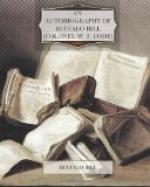“What kind of a present?” I inquired, seeing no indication of any package about Jack.
“A bottle of whisky!” he almost shouted.
I clapped my hand over his mouth. News that whisky was in the camp was likely to cause a raid by a large number of very dry scouts and soldier men. Only when Jack and I had assured ourselves that we were absolutely alone did I dare dip into his saddle pockets and pull forth the treasure. I will say in passing that I don’t believe there is another scout in the West that would have brought a full bottle of whisky three hundred miles. But Jack was “bone dry.” As Crawford refused to join me, and I was never a lone drinker, I invited General Carr over to sample the bottle. We were just about to have a little drink for two when into camp rode young Lathrop, the reporter for the Associated Press to whom we had given the name of Death Rattler. Death Rattler appeared to have scented the whisky from afar, for he had no visible errand with us. We were glad to have him, however, as he was a good fellow, and certainly knew how to appreciate a drink.
For two or three days the command pushed on, but we did not seem to gain much on the Indians. They apparently knew exactly where we were and how fast we were going, and they moved just as fast as we did.
On the fourth day of our pursuit I rode about ten miles ahead of the command till I came to a hill which gave a fine view of the surrounding country. Mounting this, I searched the hills with my field-glasses. Soon I saw a great column of smoke rising about ten miles down the creek. As this cloud drifted aside in the keen wind, I could see a column of men marching beneath it. These I at first believed to be the Indians we were after, but closer study revealed them as General Terry’s soldiers.
I forthwith dispatched a scout who was with me to take this news to Crook. But he had no more than gone when I discovered a band of Indians on the opposite side of the creek and another party of them directly in front of me. For a few minutes I fancied that I had made a mistake, and that the men I had seen under the dust were really Indians after all.
But very shortly I saw a body of soldiers forming a skirmish line. Then I knew that Terry’s men were there, and that the Indians I had seen were Terry’s scouts. These Indians had mistaken me for an Indian, and, believing that I was the leader of a big party, shouted excitedly: “The Sioux are coming.” That is why the general threw out the skirmish line I had observed.
General Terry, on coming into the Post, ordered the Seventh Cavalry to form a line of battle across the Rosebud; he also brought up his artillery and had the guns unlimbered for action, doubtless dreading another Custer massacre.
These maneuvers I witnessed from my hill with considerable amusement, thinking the command must be badly frightened. After I had enjoyed the situation to my heart’s content I galloped toward the skirmish line, waving my hat. When I was within a hundred yards of the troops, Colonel Wier of the Seventh Cavalry rode out to meet me. He recognized me at once, and convoyed me inside the line, shouting to the soldiers:




